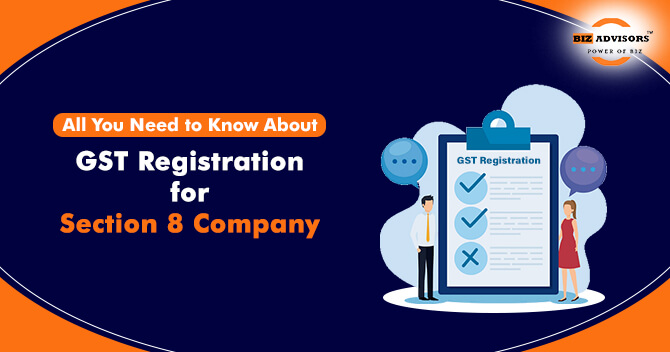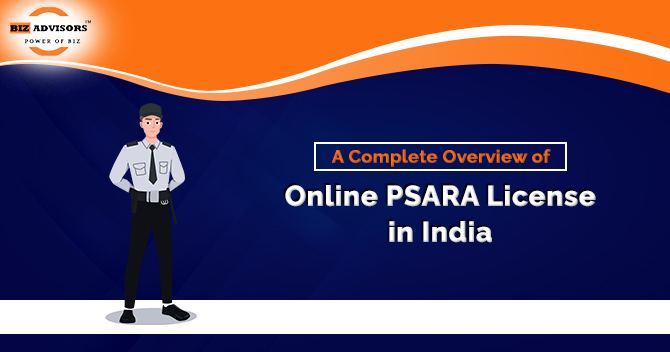A Section 8 company is primarily created to further non-profit objectives such as those related to business, commerce, the arts, charity, education, religion, environmental protection, social welfare, sports research, and so forth. A Section 8 Company cannot be incorporated without at least two directors. Additionally, a Section 8 Company is not required to have a specific minimum paid-up capital. A non-profit organization may register with the Registrar of Societies in India or incorporate as a non-profit corporation under Section 8 of the 2013 Company Act. Any profits made by this company, if any, are used to further its objectives as opposed to paying dividends to shareholders. Under the earlier Companies Act of 1956, a Section 8 Company was the same as a Section 25 Company. To reflect this change, Section 25 of the 2013 Companies Act has been renamed Section 8. In this article, we will discuss GST Registration for Section 8 Company.
What is GST Registration for Section 8 Company?
Please take note that a Section 8 Company must register with GST if it is subject to the GST Act. This is relevant to Section 8 Company GST Registration. For Section 8 firms, a number of companies in the market offer company registration and GST registration. The price is between 10,000 and 25,000. A trust, for instance, would cost less to register than a Section 8 business, for example. The reason is that a Section 8 firm needs additional clearance from the central government in addition to several other procedures.
Advantages of GST Registration for Section 8 Company
The following are the advantages of GST Registration for Section 8 Company:
Donor Exemption:
Sections 80 G and 12 of the Income Tax Act of 1926 exempt any donation received from a Section 8 firm from taxes.
Limited liability for member
Members of the section 8 corporation have limited liability for the subscribed shares because they are not responsible for the losses suffered by the firm.
Tax advantages:
The Company benefits from the tax advantages provided by Section 80 G of the Income Tax Act of 1956 since Section 8 companies are exempt from CARO (The Company Auditor’s Report Order).
Unrestricted Capital:
Section 8 firms have the freedom to change their capital structure whenever they see fit because there is no minimum capital requirement at the time of establishment.
No need to pay stamp duty:
The stamp duty levied on MOA is not required to be paid by Section 8 corporations (Memorandum of Association).
Requirements
The following are the important requirement of GST Registration for Section 8 Company:
1. An individual or a HUF
2. Two or more individuals who will serve as directors and adhere to all corporate requirements
3. The directors must all have Indian residency, at least one of them.
4. The company must have been founded only for charitable, educational, sporting, religious, social welfare, and environmental purposes.
5. Direct or indirect distribution of the company’s profits to its shareholders and board of directors is not permitted.
6. The company’s founders, board of directors, and employees are not eligible to take compensation in kind or cash.
Documents required for GST Requirement for Section 8 Company
The following are the documents required for GST Registration for Section 8 Company:
· Date of formation of the company
· Pan Card of society/Trust/NGO
· Passport size Photographs and PAN Card of Promoter/ Partners
· Contact Details (it includes: mailing address, website, address, and telephone number)
· The company’s Business Registration Number (BRN).
· The business’s identification number (INN).
· The various business activities that the corporation engages in
· The company’s mission and goals
· The business’s yearly revenue
· The many business activities that the organisation has engaged in in the past
Impact of GST Registration for Section 8 Company
The following are the impacts of GST Registration for Section 8 Company:
Serving as a supplier of products and services
The GST statute includes a trust, society, and Section 8 corporations in the definition of a taxable person. An exception to this rule is that these entities will not be regarded as taxable people under the GST if they engage in economic activities like trade and commerce.
Nevertheless, the Maharashtra Authority of Advance Ruling (AAR) for GST decided that products and services given by charitable organisations for fee classification will be subject to GST. It was further said that if their annual revenue from the sale of these products and services exceeds INR 20 lakhs, all organisations must register under the GST requirements.
For instance, any Section 8 business offering women’s literacy classes needs to register for GST.
Therefore, this decision clears up any confusion about the application of GST to Section 8 entities.
Being a consumer of products and services
When it comes to the money received by non-profit organizations, it is only excluded from direct taxes, or from taxes under the income tax legislation. However, there is no such exemption under the GST law[1].
For instance, a non-profit cannot use its 12A or 12AA certificates to demonstrate that it is exempt from paying GST on rent if it operates out of a commercial office.
Therefore, GST is applicable to non-profits on all of the goods and services they have acquired. There is one more point, though: RCM (Reverse Charge Mechanism) is applicable when paying for any legitimate service or moving products.
(Anyone who is compulsorily obligated to pay tax under RCM must be registered under GST.)
Conclusion
All GST (Goods and Services Tax) rules that affect Section 8 companies are described in this article. Businesses registered under Section 8 of the Companies Act of 2013 greatly improved society. Their main reason for existing is to further the non-profit objectives of society, including trade, commerce, charity, education, sports research, religion, social welfare, and environmental preservation. Section 8 Company are therefore covered by the GST law’s definition of a taxable person. Seek professional advice to get GST Registration for Section 8 Company. You can also reach Bizadvisors.io for more information.
Read our article:How to Check GST Registration Status: A Complete Guide
 9559179325
9559179325 9559179325
9559179325





